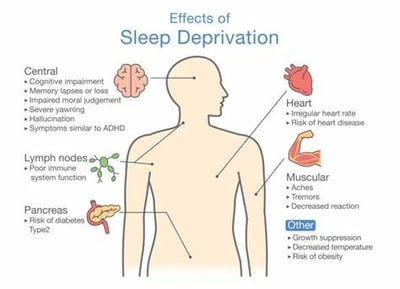What is Shift Work
Someone who is a shift worker doesn't work typical hours and days. This means either working non-typical hours (8ish-5ish), working rotation work (changing shifts), or working many days on followed by many days off. Especially in Alaska, summer time means a large number of seasonal shift-work jobs.
Shift workers include:
- Pilots
- Construction workers
- Police workers
- Doctors and nurses
- Firefighters
- Taxi/Lyft/Uber drivers
- Customer service
- Retail
Shift work can be beneficial for several reasons: higher pay for less desirable shifts, flexibility with scheduling, and longer periods without work. However, shift work can also make it more challenging for these individuals to have normal sleep schedules. Please continue reading to learn more about what shift work sleep disorder is, and how to overcome it as a shift worker.
What is Shift Work Sleeping Disorder
Shift-work sleeping disorder (SWD) is a circadian rhythm disorder that results directly from shift work. Not everyone who works odd/long hours develops SWD, but you are certainly at a much higher risk for developing it if you work in shifts.
Some symptoms of SWS mainly include:
- Chronic fatigue
- Insomnia
- Circadian rhythm disorders
- Reduced performance in all areas of life
- Lower life expectancy
- Chronic irritability and depression
- Health problems
Sleep and Health Risks of Shift Work

Shift workers are at increased risk for a variety of chronic illnesses, such as [National Sleep Foundation]:
- Heart disease
- Gastrointestinal diseases
- Ulcers
- Metabolic syndrome
There are also psychological concerns with shift work, such as:
- Low morale from impacted social life
- Risk of depressive mood syndromes
Shift workers are also more prone to developing sleeping disorders, such as circadian rhythm disorders and insomnia.
On a related note, there are safety concerns for shift work as well. Driving home after a 24-hour shift, tired and fatigued, poses similar safety concerns as if you were driving drunk. Sleep deprivation from shift work also impacts decision making, reaction times, and so on.
How to Improve Sleep as a Shift Worker
Improving sleep as a shift worker is difficult. Some tips to get better sleep as a shift worker are:
- Try not to work a number of night shifts in a row
- Avoid frequently rotating shifts
- Try to avoid long commutes
- Ensure that you have an excellent, sleep inducing bedroom environment, such as blackout curtains, ear plugs, etc.
- Try and get consistent exercise on non-shift days
- Set a bedtime that you adhere to religiously, even on non-work days
- Avoid oversleeping on non-work days
- Take short naps throughout shift-work
- Avoid excessive screen use before bed, especially on work days at it will delay sleep
- Avoid caffeine and alcohol before bed, as they can delay sleep
- Invest in a comfortable bed, sheets, and pillow
- Setting a bedtime routine
Having a sleep schedule is an assured method for obtaining consistent sleep on work and non-work days. Good sleep schedules and habits may replace sleep medicine supplementation in some cases. Sleep deprivation from shift work is insidious and difficult to identify. Sleep deprivation is often followed by binge sleeping, which feels good momentarily, but does not prevent long-lasting sleep benefits.
If you are a shift worker in Alaska and are concerned you have SWD, please click the orange button below to take a free online sleep test and work with one of our sleep health professionals.


